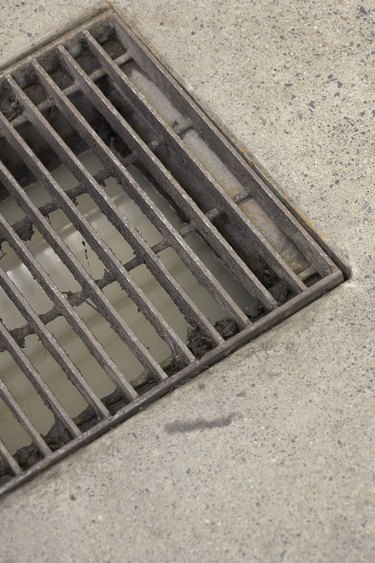 Gasoline spills can send dangerous vapors through sewer systems. Image Credit: Jupiterimages/Photos.com/Getty Images
Gasoline spills can send dangerous vapors through sewer systems. Image Credit: Jupiterimages/Photos.com/Getty Images
Spilled gasoline causes gas fumes to accumulate in a sump pump's basin, but the source might not be obvious. Gasoline containers unsafely stored in the basement can generate fumes, but gasoline odors can also flow from spills outside, from gasoline poured down storm drains, or from gasoline used as a cleaner on outdoor projects. Call your fire department for advice if you smell a strong gasoline odor in the basement.
Video of the Day
Gasoline Vapors
Gasoline only burns when this very volatile liquid evaporates and mixes with air. Gasoline vapors weigh about four times as much as air, so fumes sink to the ground and flow to the nearest low point. Gasoline fumes collect in the basement's lowest level, the sump pump pit. If the sump pump pit connects to the sewer system, vapors from gasoline in the sewer can emerge through the pit. Even low levels of fumes present a real danger of explosion and fire. A spark can ignite a gasoline-and-air mixture only 1.6 times the density of air, according to the American Burn Association.
Sources
Faint gasoline odors in a sump pump pit can originate in leaking storage containers or unused equipment in or near the basement. Store gasoline in UL-approved containers, in a storage building not connected to the house. Even approved containers can develop leaks. The fuel systems of gas-powered machines always vent fumes and such machines should not be stored within the home. Camping stoves and "white gas" fuel canisters also create hazards. One gallon of gasoline converted to vapors packs the explosive power of 14 sticks of dynamite, according to the Texas Department of Insurance. Much smaller amounts can cause explosions large enough to set fires.
Outside Spills
Gasoline spilled on the ground near a basement wall can seep into the basement and emerge as fumes. Spilling gasoline while filling the tanks of lawn equipment can contaminate ground near the home. Plastic gas cans include storage spouts and vents, both of which screw tightly shut for safe transportation. Setting a sealed gas can in the sun can cause leaks from the pressure of the expanding gas. Homes situated near gas stations and other storage facilities might accumulate fumes from commercial spills. Gasoline floats on groundwater and spills flushed into storm drains sometimes travel for blocks.
Remedies
Opening a door or basement window or turning on a ventilation fan might not clear gasoline fumes safely from a basement. Heavy gas fumes remain at floor level while cleaner air moves in and out through vents. Removing gasoline fumes safely requires explosion-proof fans that do not generate sparks, as well as special conduits to pull fumes from the lowest point of the basement. If you detect a strong odor of gas, call your fire department for advice. Gas fumes building up in the basement can reach the level of pilot lights in hot water heaters or furnaces, or ignite when electric appliances start up.







































